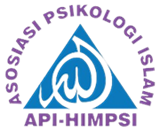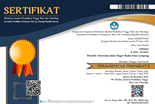Hubungan Antara Self Compassion Dan Peer Group Influence Dengan Subjective Well-Being Pada Mahasiswa Yang Mengikuti Pembelajaran Daring
Abstract
The latest policy in the world of education regarding teaching and learning activities that switched to using the online system since the covid-19 pandemic, become a challenge for various groups, including students. Previously research found the relationship and the role of self-compassion for subjective well-being in students but not yet been research in-depth related to subjective well-being in students who are undergoing online learning and there is not much-related research on the role of the independent variable peer group influence on subjective well-being on students. The purpose of this study is to analyze the relationship between self-compassion and peer group influence on the subjective well-being of students who take online learning.
This research was conducted on 135 respondents from the Faculty of Ushuluddin and Religious Studies at UIN Raden Intan Lampung. Method data collection used in this study using the SWLS (Satisfaction with Life Scale) scale of 13 items (á = 0.844) and the PANAS scale (Positive and Negative Affect Schedule) as many as 13 items (á = 0.937) to measure the level of subjective well-being, and a self-compassion scale of 17 items (á = 0.909) and the peer group influence scale of 8 items (á = 0.779). The analysis technique used is multiple regression analysis with JASP software help vers.15.
The results of the data analysis show:
1. The results of hypothesis testing with an R-value of 0.647 and an R Square of 0.419, which means the variance of the capable subjective well-being explained by self-compassion and peer group influence is 0.419 or a percentage of 41.9% while the rest explained by other things not examined in the study.
2. The results of the correlation test of the self-compassion variable with the Pearson value correlation 0.602 p < 0.001 which means partially self. variable compassion has a relationship with subjective well-being.
3. The test results on the independent variable peer group influence found the value of Pearson correlation 0.392 p < 0.001, this means partially variable peer group influence has a relationship with subjective well-being.
Keywords: Peer Group Influence, Self Compassion, Subjective Well-Being
Full Text:
PDFReferences
Abidin, H., & Borualogo, I. (2021). Pengaruh pertemanan terhadap subjective well-being pada siswa SMP korban perundungan. Prosiding Psikologi, 6(2), 22329.
Amanah, F., Situmorang, N. Z., & Tentama, F. (2020). Subjective Well-Being Mahasiswa Pada Masa Pandemi Covid-19 Dilihat Dari Hope dan Employability. Psikostudia, 10(10), 1–11. https://doi.org/10.30872/psikostudia
Arikunto, S. (2011). Prosedur penelitian : suatu pendekatan praktik (Ed. Rev. V). Jakarta : Rineka Cipta 2011.
Azwar, S. (2019). Penyusunan skala psikologi (2nd ed.). Pustaka Pelajar.
Bankole Adeyemi, F. (2019). Peer group influence on academic performance of undergraduate students in Babcock University, Ogun State. African Educational Research Journal, 7(2), 81–87. https://doi.org/10.30918/aerj.72.19.010
Diener, E. (2000). Subjective well-being: The science of happiness and a proposal for a national index. American Psychologist, 55(1), 34–43. https://doi.org/10.1037/0003-066X.55.1.34
Diener, E., Lucas, R. E., & Oishi, S. (2018). Advances and open questions in the science of subjective well-being. Collabra: Psychology, 4(1), 1–49. https://doi.org/10.1525/collabra.115
Dini, P. R., & Iswanto, A. (2019). Hubungan dukungan sosial teman sebaya dengan tingkat stres dalam menyususn tugas akhir pada mahasiswa Stikes Ngudi Waluyo Ungaran. Jurnal Ilmu Kebidanan Dan Kesehatan, 10(2).
Erhamwilda. (2021). Kuliah BK Pengaruh Teman Sebaya. Youtube.
Evarist, M. (2010). Peer group influence, alcohol consumption, and secondary school students’ attitudes towards school. 2005, 1–12.
Fadilah, N. (2019). Pengaruh prokrastinasi akademik dan dukungan sosial terhadap subjective well-being pada mahasiswa tingkat akhir di universitas pendidikan indonesia. Universitas Pendidikan Indonesia.
Ferrari, M., Hunt, C., Ashish, H., J Abbot, M., P Beath, A., & A Einstein, D. (2019). Self-Compassion interventions and psychosocial outcomes: A meta-analysis of RCTs. Mindfulness.
Halim, A. R. (2015). Pengaruh Self-Compassion Terhadap Subjective Well-Being pada Mahasiswa Asal Luar Jawa. Skripsi.
Haryati, S. (2020). Hubungan self efficacy dan peer group influence dengan kedisiplan belajar pada siswa. Universitas Islam Negeri Raden Intan Lampung.
Hasanah, F., & Hidayati, F. (2017). Hubungan antara self compassion dengan alienasi pada remaja (Sebuah studi korelasi pada siswa SMK Negeri 1 Majalengka). Jurnal Empati, 5(4), 750–756.
Hasanah, U., Fitri, N. L., Supardi, S., & PH, L. (2020). Depression Among College Students Due to the COVID-19 Pandemic. Jurnal Keperawatan Jiwa, 8(4), 421. https://doi.org/10.26714/jkj.8.4.2020.421-424
Ilhamsyah, D., & Borualogo, I. (2020). Pengaruh kepuasan pertemanan terhadap subjective well-being remaja panti asuhan. Prosiding Psikologi, 6(230–237).
Kansky, Jessica. Diener, E. (2017). Benefits of well-being: Health, social relationships, work, and resilience. Journal of Positive SChool Psychology.
Moreira, A., Yunes, M., Nascimento, C., & Bedin, L. (2021). Children’s subjective well-being, peer relationships and resilience: An integratif literature review. Child Indicators Research, 1723–1742.
Nadeak, E. (2019). Peran self compassion dan efikasi diri akademik dengan subjective well being pada mahasiswa tahun petama universitas mercu buana yogyakarta. Universitas Mercu Buana Yogyakarta.
Nastiti, R., & Hayati, N. (2020). Pembelajaran Daring pada Pendidikan Tinggi: Tantangan Bagi Mahasiswa dan Dosen di Tengah Pandemi. INOBIS: Jurnal Inovasi Bisnis Dan Manajemen Indonesia, 3(3), 378–390. https://doi.org/10.31842/jurnalinobis.v3i3.145
Papalia, D., & Feldman, R. (2017). Menyelami Perkembangan Manusia (12th ed.). Mc Graw Hill.
Ratnasari, R., & Sumiati, N. (2017). Pengaruh self-compassion, religiusitas, support group dan pendapatan terhadap kesejahteraan subjektif orang tua anak tunagrahita. JP3I.
Risna, I. G., Devi, P., & Asmoro, Y. S. (2020). Hubungan self compassion untuk meningkatkan subjective well-being pada mahasiswa organisasi unesa. Prosiding Seminar Nasional LP3M 2.
Septrianda, E., Malay, M., & Ulfah, K. (2020). Hubungan forgiveness dengan subjective well-being pada remaja panti asuhan. Jurnal Psikologi Malahayati, 2(1), 83–91.
Sudaryono. (2019). Metodologi penelitian kuantitatif, kualitatif, dan mix method (2nd ed.). PT RajaGrafindo Persada.
Sugiyono. (2015). Metode penelitian kuantitatif, kualitatif, dan R&D. Alfa Beta.
Syauqi, T. A. (2019). Gambaran Motivasi Berprestasi Peer Group Religius Pada Mahasiswa. Psikis : Jurnal Psikologi Islami, 5(2), 133–139. https://doi.org/10.19109/psikis.v5i2.2936
Tiyas, R. R., & Utami, M. S. (2021). Online Learning Saat Pandemi Covid-19: Stres Akademik terhadap Subjective Well-being dengan Adaptive Coping sebagai Mediator. Gadjah Mada Journal of Psychology (GamaJoP), 7(2), 225. https://doi.org/10.22146/gamajop.64599
Triana, Y. (2019). Hubungan self-compassion dengan subjective well-being pada mahasiswa perantau.
Wang, M., Kiuru, N., Degol, J., & Salmela-Aro, K. (2018). ). Friends, academic achievement, and school engagement during adolescence: A social network approach to peer influence and selection effects. Learning and Instruction, 58.
Wicaksana, R. (2020). Hubungan self-compassion dan subjective well-being. Universitas Gadjah Mada.
Wijayanti, P., Pebriani, L., & Yudiana, W. (2019). Peningkatan kesejahteraan subjektif di sekolah pada siswa melalui “peer support and teaching method program.” Jurnal Ilmu Psikologi Dan Profesi, 3(1), 31–42.
Wiridjati, W., & Roesman, R. R. (2018). Fenomena Penggunaan Media Sosial Dan Pengaruh Teman Sebaya Pada Generasi Milenial Terhadap Keputusan Pembelian. Jurnal Manajemen Dan Pemasaran Jasa, 11(2), 275. https://doi.org/10.25105/jmpj.v11i2.2950
Zessin, U., Dickhäuser, O., & Garbade, S. (2015). The Relationship Between Self-Compassion and Well-Being: A Meta-Analysis. Applied Psychology: Health and Well-Being, 7(3), 340–364. https://doi.org/10.1111/aphw.12051
DOI: http://dx.doi.org/10.24042/ajp.v5i1.13986
Refbacks
- There are currently no refbacks.
Copyright (c) 2022 ANFUSINA: Journal of Psychology











